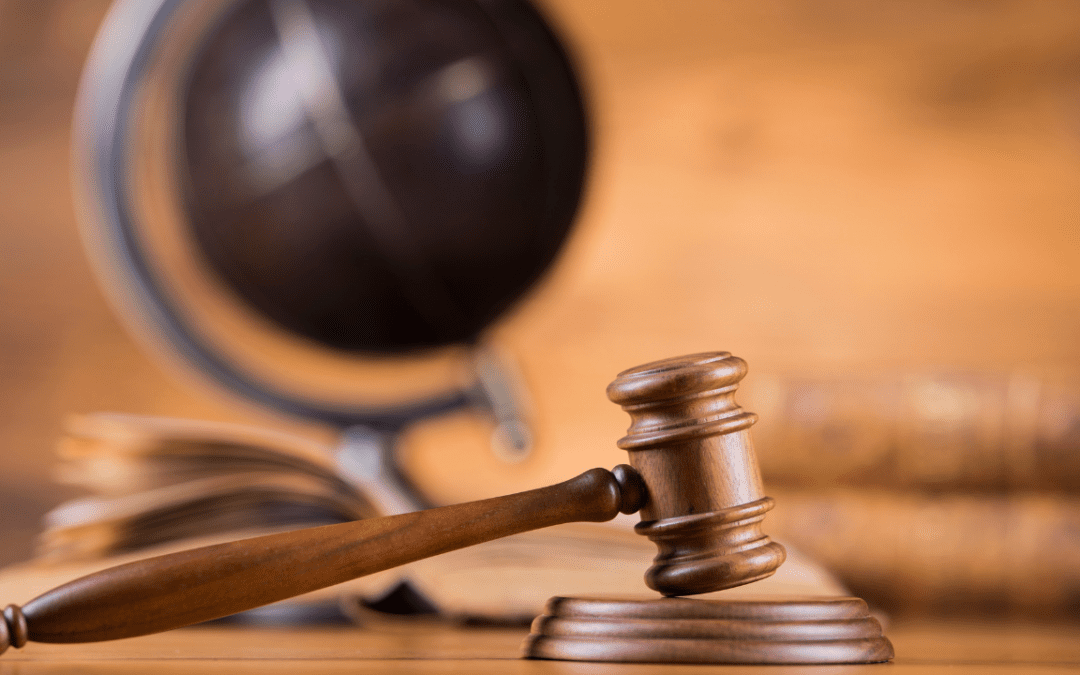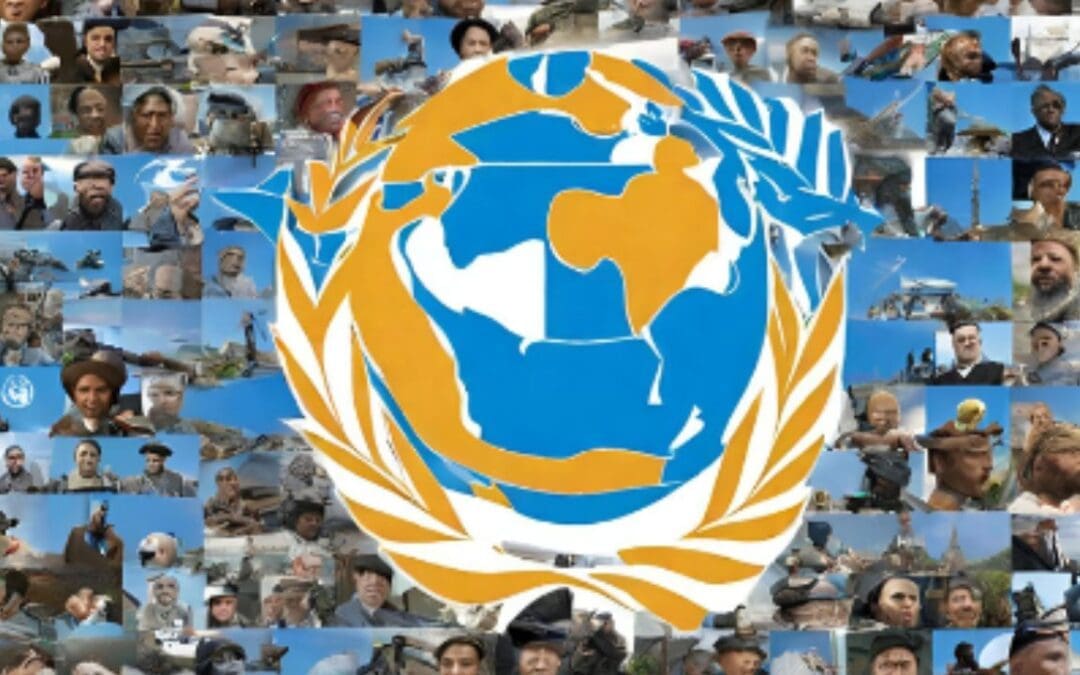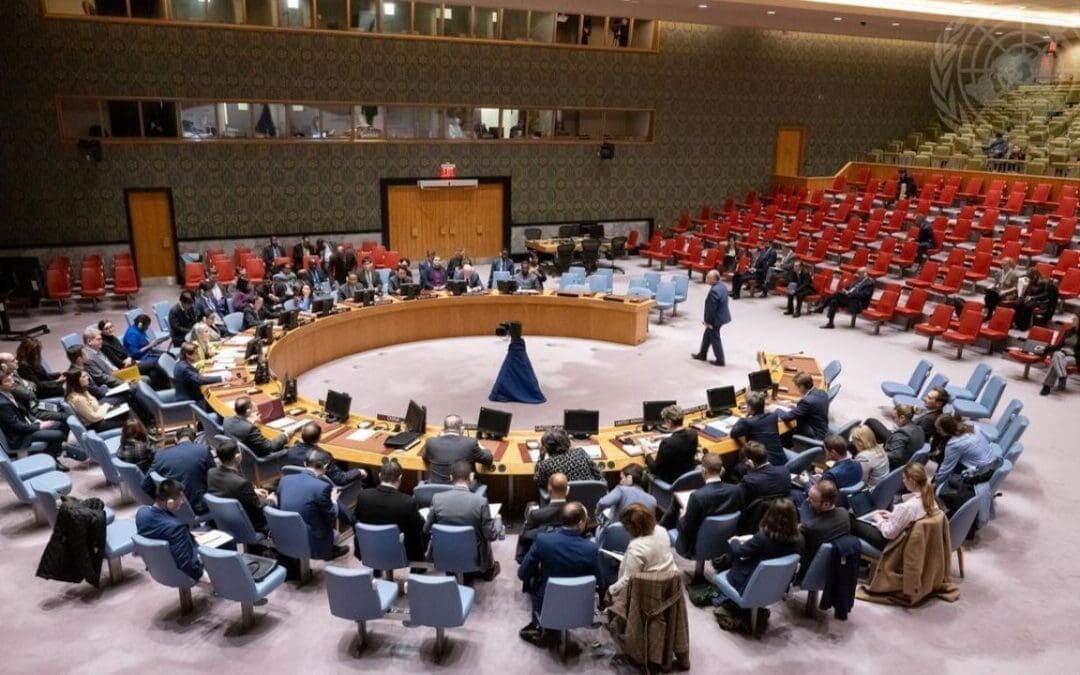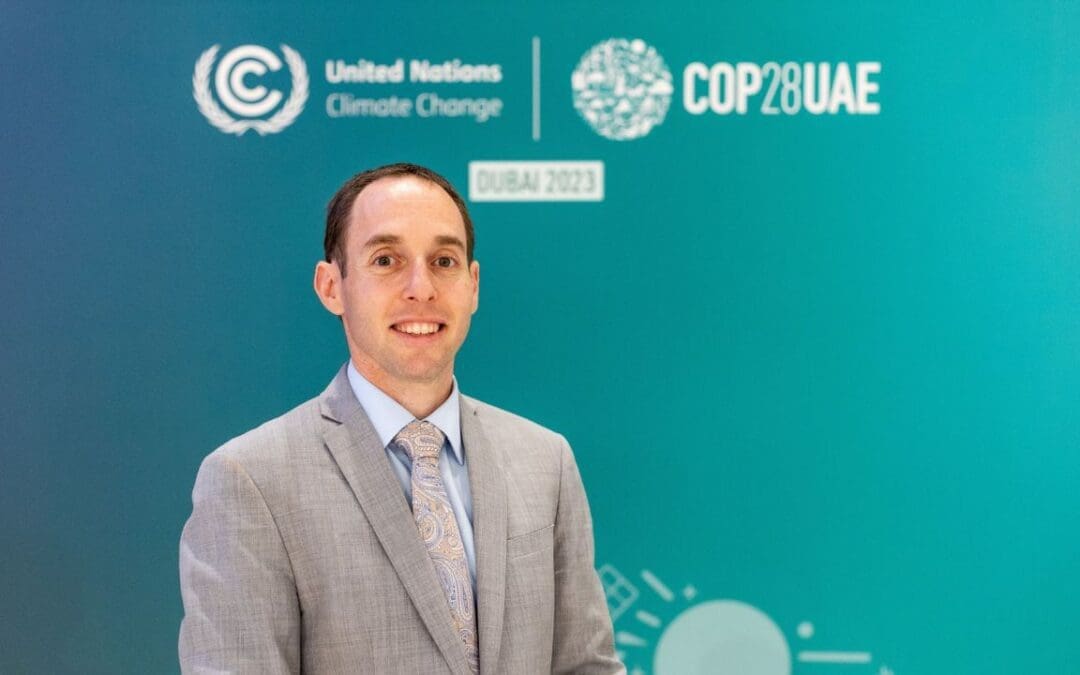
by Lawrence Wittner | Nov 22, 2024 | Global Cooperation
The latest rollout of the hyper-nationalist “America First” policy underscores the world’s long-term slide toward catastrophe.
Within nations, when conflicts inevitably erupt, there are laws, as well as police, courts, and governments that enforce the laws.
On the global level, however, governance is quite limited. The UN Security Council, responsible under the UN Charter for maintaining international peace and security, is frequently hamstrung by the veto, which the five great powers of 1945 insisted upon according to themselves. By this April, it had been employed 321 times. Although the International Court of Justice and the International Criminal Court deliver legally binding judgments, based on international law, such judgments are not always obeyed. The UN General Assembly votes on key international issues as well, but such votes are merely advisory. Consequently, these international organizations issue laudable statements, while the most powerful nations all too frequently defy them and go on their merry, marauding way.
The Russian government is currently continuing its massive military invasion of Ukraine and annexing its territory while ignoring the demands of the UN General Assembly and the International Court of Justice to end Russia’s aggression and withdraw from Ukraine. Similarly, the Israeli government ignores the demands of these world organizations to end its brutal war upon and occupation of Palestine.
From the overwhelming votes in the UN General Assembly to condemn the Russian and Israeli invasions, we can see what most of the world’s nations want done to address these terrible situations. But there is no implementation of their demand to respect international law―law that lacks effective international enforcement.
Over the course of human history, this international lawlessness has contributed to a might-makes-right approach to world affairs, in which militarily powerful nations play the dominant role. Naturally, then, nations have gravitated toward military buildups, making some very powerful, indeed.
According to the Stockholm International Peace Research Institute, the top military spenders in 2023 (the latest year for which figures are available) are the United States ($916 billion), China ($296 billion), Russia ($109 billion), and India ($84 billion). But others―Israel ($28 billion) and North Korea (amount unknown)―also rank among the big-time military spenders. All told, the nations of the world devoted at least $2,443 billion to war and preparations for war, an increase over the previous year of nearly 7 percent.
Military spending is not the only way to measure militarism. The Global Peace Index 2024, compiled by the Institute for Economics and Peace, used the level of societal safety and security, the extent of ongoing domestic and international conflict, and the degree of militarization to examine 163 independent nations and territories. Not surprisingly, the major military powers ranked low on the scale of peacefulness, including China (88th), India (116th), the United States (132nd), North Korea (152nd), Israel (155th), and Russia (157th).
By contrast to these military behemoths―possessing the mightiest military forces in world history, including arsenals of nuclear weapons―the United Nations has remained a relatively anemic organization, speaking truth but lacking power.
Sometimes, the major military powers cope with the explosive global situation by making deals with one another―although such deals rarely create the basis for a peaceful world. For example, the August 23, 1939 Molotov-Ribbentrop Pact (better known as the Nazi-Soviet Pact) provided for détente between Nazi Germany and the Soviet Union, two highly-militarized nations that had previously been at odds. In this secret protocol, Hitler and Stalin agreed to share Poland and give Lithuania, Latvia, Estonia, Finland, and other East European territories to the Soviet Union. On September 1, Germany invaded western Poland, thereby beginning World War II. Soon thereafter, the Soviet Union took action to seize its share of the spoils. As early as July 1940, however, the German High Command began planning its invasion of the Soviet Union, which occurred the following June, ending this cozy arrangement.
On other occasions, major military powers have formed alliances. Wary of a military attack by their rivals or eager to bolster their strength for a military attack upon them, these “great powers” have enhanced their military might by creating military alliances with weaker nations. The weaker nations, for their part, sometimes seek alliances with the militarily powerful to guarantee their own security.
But alliances, too, have provided a shaky basis for maintaining international peace. During the Cold War, the North Atlantic Treaty Organization (dominated by the United States) and the Warsaw Pact (dominated by the Soviet Union) engaged in remarkably dangerous nuclear confrontations. Furthermore, both alliances experienced serious internal convulsions. In 1956, Hungary withdrew from the Warsaw Pact, leading to a Soviet invasion that slaughtered 2,500 Hungarians and sent 200,000 fleeing abroad.
Today, the traditional system of every-nation-for-itself is leading to disaster. There are currently 56 active military conflicts in the world, the largest number since the end of World War II. These conflicts are also becoming more internationalized, with 92 nations engaged in a conflict beyond their borders. According to the Global Peace Index, “there has been a significant rise in both conflicts and battle deaths in the past two decades, with battle deaths reaching a thirty-year high.”
Overarching this grim toll lies a revived nuclear arms race, increasingly likely to erupt into a nuclear war that will annihilate most life on Earth.
In this situation, there is a desperate need for effective global governance. Or, to put things differently, the world needs a stronger United Nations―strong enough to resolve conflicts among nations and, thereby, maintain international peace and security.
The task of strengthening global governance is difficult, but not impossible. There are ways to limit the use of the veto in the UN Security Council (as championed by many nations), transfer security issues to the UN General Assembly (where there is majority rule and no veto), and increase the jurisdiction of international judicial bodies. It’s also necessary and possible to provide the UN with an independent source of income to fund an expanded range of activities.
The time has come to transform the United Nations into a federation of nations that can effectively uphold international law―a government for the world. With such a government, we would have a much better chance of restraining outlaw nations and averting the nuclear catastrophe that looms before us.

by Sovaida Maani Ewing | Feb 8, 2024 | Peace
Like it or not, our world has become so interconnected and interdependent that events that have hitherto been regarded as regional in nature now threaten our well-being everywhere. The Ukraine war triggered global food and energy crises, global inflation, exacerbated the worldwide refugee crisis, and renewed the specter of a nuclear war. The war in Gaza has added to these woes by sparking reactions that threaten global shipping through the Suez Canal, putting a further dent in our global economy by raising consumer prices. We must act swiftly and effectively now to stem the cancerous spread of violence before we find ourselves engulfed in a global conflagration.
The international community must step up and shoulder a responsibility it has, for too long, abdicated: to maintain and restore peace in the world. We can begin by going beyond mere words and adopting mechanisms to operationalize and implement a principle known as the Responsibility to Protect, adopted unanimously by 193 nations at the UN Summit of world leaders in 2005. It provides that if a government is unable or unwilling to protect its people, it falls to the international community to step in and shoulder that responsibility.
A mechanism that is worth considering along these lines is that of making Gaza an international trust for a limited period of time until it is ready for self-governance. Even if there is no appetite to revive the Trusteeship Council, an organ of the United Nations which was suspended (though not dismantled) in 1994, we can revive and apply its attributes to create this trust as a stepping-stone for peace in the Middle East. We should urge the UN General Assembly to create an ad hoc Trusteeship Council that would act as a time-limited cocoon (say of 5 years) around Gaza, allowing it to heal at all levels until it is able to take up its role as a mature member of the international community of nations. The case of South West Africa’s evolution to becoming Namibia provides us with a useful precedent for setting up such an ad hoc Council and warns us of pitfalls to avoid.
Many benefits flow from this approach: first, Gaza would be under the direct administration and control of the UN, which would appoint an ad hoc Trusteeship Council for Gaza (and possibly parts of the West Bank) composed of a mix of countries from the region (such as Jordan, Egypt, and Saudi Arabia) and beyond (like Canada, Germany, France, the UK and Australia) on condition that they are committed to the well-being of all parties to the conflict and to establishing peace in the region. Having such a Council frees Israel from the burden of administering these territories and affords the Palestinians the space to recover, develop and grow into an independent self-governing entity.
Second, Gaza could be demilitarized, thereby ensuring the security of both its people and its neighbors. Here again, we can turn to the successful experiences of Northern Ireland and East Timor for lessons in how best to achieve this.
Third, an economic recovery and reconstruction plan akin to the Marshall Plan could be developed for Gaza. Moreover, the administering authority should be able to monitor all funds coming into Gaza and ensure that they will be used solely for constructive and peaceful purposes and not diverted for the purchase of weapons or instruments of war that can threaten the peace.
Fourth, a system of education that is rooted in teaching coexistence and peace and is coupled with the provision of training in good governance should be introduced, allowing for a cadre of potential leaders representative of the people of Gaza to emerge.
Last, the UN can arrange for free and fair elections to be held, as it did in Namibia.
It is time to take bold steps to spare our world from the ravages of war and establish a lasting peace.
This article was originally published in PeaceVoice.
Image Credits: Stepping stones across the R.Mole below Box Hill by Jonathan Hutchins, CC BY-SA 2.0, via Wikimedia Commons

by Lawrence Wittner | Jan 31, 2024 | Peace
Although, according to the UN Charter, the United Nations was established to “maintain international peace and security,” it has often fallen short of this goal. Russia’s ongoing military invasion of Ukraine and the more recent Israeli-Palestinian war in Gaza provide the latest examples of the world organization’s frequent paralysis in the face of violent international conflict.
The hobbling of the Security Council, the UN agency tasked with enforcing international peace and security, bears the lion’s share of the responsibility for this weakness. Under the rules set forth by the UN Charter, each permanent member of the Security Council has the power to veto Security Council resolutions. And these members have used the veto, thereby blocking UN action.
This built-in weakness was inherited from the UN’s predecessor, the League of Nations. In that body, a unanimous vote by all member nations was required for League action. Such unanimity of course, proved nearly impossible to attain, and this fact largely explains the League’s failure and eventual collapse.
The creators of the United Nations, aware of this problem when drafting the new organization’s Charter in 1944-45, limited the number of nations that could veto Security Council resolutions to the five major military powers of the era―the United States, the Soviet Union, Britain, China, and France.
Other nations went along with this arrangement because these “great powers” insisted that, without this acceptance of their primacy, they would not support the establishment of the new world organization. The Charter’s only restriction on their use of the veto was a provision that it could not be cast by a party to a dispute―a provision largely ignored after 1952. Fortifying the privileged position of these five permanent Security Council members, the Charter also provided that any change in their status required their approval.
In this fashion, the great powers of the era locked in the ability of any one of them to block a UN Security Council resolution that it opposed.
Not surprisingly, they availed themselves of this privilege. By May 2022, Russia (which took the seat previously held by the Soviet Union), had cast its veto in the Security Council on 121 occasions. The United States cast 82 vetoes, Britain 29, China 17, and France 16.
As the Council’s paralysis became apparent, proponents of UN action gravitated toward the UN General Assembly. This UN entity expanded substantially after 1945 as newly-independent countries joined the United Nations. Moreover, no veto blocked passage of its resolutions. Therefore, the General Assembly could serve not only as a voice for the world’s nations, but as an alternative source of power.
The first sign of a shift in power from the Security Council to the General Assembly emerged with the General Assembly’s approval of Resolution 377A: “Uniting for Peace.” The catalyst was the Soviet Union’s use of its veto to block the Security Council from authorizing continued military action to end the Korean War. Uniting for Peace, adopted on November 3, 1950 by an overwhelming vote in the General Assembly, stated that, “if the Security Council, because of lack of unanimity of the permanent members, fails to exercise its primary responsibility for the maintenance of international peace and security . . . the General Assembly shall consider the matter immediately with a view to making appropriate recommendations to members for collective measures.” To facilitate rapid action, the resolution created the mechanism of the emergency special session.
Between 1951 and 2022, the United Nations drew upon the Uniting for Peace resolution on thirteen occasions, with eleven cases taking the form of the emergency special session. In addition to dealing with the Korean War, Uniting for Peace resolutions addressed the Suez confrontation, as well as crises in Hungary, Congo, Afghanistan, Palestine, Namibia, and Ukraine. Although, under the umbrella of Uniting for Peace, the General Assembly could have recommended “armed force when necessary” against violators of international peace and security,the Assembly adopted that approach only during the Korean War. On the other occasions, it limited itself to calls for peaceful resolution of international conflict and the imposition of sanctions against aggressors.
These developments had mixed results. In 1956, during the Suez crisis, shortly after the General Assembly held a Uniting for Peace session calling for British and French withdrawal from the canal zone, both countries complied. By contrast, in 1980, when a Uniting for Peace session called for an end to the Soviet invasion of Afghanistan, Moscow ignored the UN demand. It could do so thanks to the fact that General Assembly resolutions are mere recommendations and, as such, are not legally binding.
Even so, global crises in recent years have heightened pressure to provide the United Nations with the ability to take effective action. In April 2022, shortly after the Russian government vetoed a Security Council resolution calling for Russia’s unconditional withdrawal from Ukraine, the General Assembly voted that, henceforth a Security Council veto would automatically trigger a meeting of the Assembly within ten days of the action to cope with the situation.
Meanwhile, numerous nations have been working to restrict the veto in specific situations. In July 2015, the UN Accountability, Coherence, and Transparency Group proposed a Code of Conduct against “genocide, crimes against humanity, or war crimes” that called upon all Security Council members to avoid voting to reject any credible draft resolution intended to prevent or halt mass atrocities. By 2022, the Code had been signed by 121 member nations. France and Mexico have taken the lead in proposing the renunciation of the veto in these situations.
These reform initiatives are likely to be addressed at the September 2024 UN Summit of the Future.
Clearly, as the history of the United Nations demonstrates, if the world organization is to maintain international peace and security, it must be freed from its current constraints.
This article was originally published in PeaceVoice.

by Jerry Tetalman | Jan 19, 2024 | Peace
The war in Ukraine has destabilized and polarized the international order. It pits two nuclear-armed superpowers, the United States and Russia, against each other. Any miscalculation can take all of us to nuclear Armageddon. This war has created untold human misery. Ending this war should be a top priority for humankind. How can the war be ended and on what terms?
Conventional wisdom holds that wars end in one of two ways. Either one side wins and the other loses or they negotiate a peace agreement by coming to an understanding that both sides can live with. The Russian invasion of Ukraine currently looks like a stalemate, with little territory being won or lost in the last year and both sides seemingly adhering to a position requiring total victory.
Russia seems to be playing the long game, of waiting out the resolve of the West to fund and support Ukraine. Sanctions on Russia have had an effect, but it still sells oil to China, India, and much of the world.
Ukraine’s goal is to regain its lost territory, maintain its current territory, and achieve security against future invasions. Russia wants to control all of Ukraine and wants to prevent it from joining NATO. The question is, can a peace agreement be made that both sides can live with?
Countries at war start to look for alternatives when victory is no longer assured or even likely. This war has reached that point. Negotiations give countries options in a no-win situation. Are the parties ready to negotiate?
Peace agreements are reached by making a win-win deal where both sides get something they want out of it. Of course, they need to compromise and give up some things as well.
Russian President Vladimir Putin is a key to any peace deal, for he must be willing to negotiate and implement any agreement reached. But the other key is Ukraine, whose territory has been invaded, occupied, and annexed by Russia.
The “deciders” will be Russia (essentially Putin) and Ukraine (the Zelensky administration). They will be the ones with representatives at the negotiating table.
Beyond “the table,” there are other influencers, such as those who support Ukraine with arms and funding–the European Union and the US. Some tacitly support Russia by continuing commerce with Putin and by not voting in the UN to sanction Russia.
If an understanding and peace settlement is to be reached between Ukraine and Russia, we must consider what institution is most capable of facilitating the necessary negotiations. The United Nations which is the world’s largest and most important international peace organization is the logical party, for this task, according to its charter, its goal is to “prevent the scourge of war.” Unfortunately, the UN Security Council is hobbled by the fact that Russia and the other great powers that emerged victorious in World War II―the United States, France, the United Kingdom, and China―exercise veto power. And Russia has vetoed Security Council action in connection with the Ukraine war.
Another option is for UN Secretary-General Antonio Guterres to organize serious peace negotiations. The role of the Secretary-General is that of chief diplomat for all nations. That official is charged with mediation and appointment of envoys to broker peace agreements. In getting such negotiations off the ground, he might find it useful to draw upon countries such as China or Turkey, both of which have a rapport with Putin.
The International Court of Justice was foreseen by the UN Charter as the primary method of resolution of disputes between Countries, offering law as an alternative to war. The law needs enforcement, and the ICJ is limited in this area. Its preliminary ruling against Russia, nearly two years ago, was ignored by Putin. The International Court of Justice has resolved the majority of the cases they hear through a voluntary agreement. If we are to move from an international system based on war and military force to a system based on law and justice, we need to empower and expand the International Court of Justice to include all nations in the UN.
We must also move forward with reform of the UN Security Council, thereby ending its paralysis when it comes to enforcing world peace and security. A more democratic United Nations, with greater funding and enforcement power, is necessary if we hope to survive this dangerous time. We can move from war to law by reforming and strengthening the United Nations, but it will take some creative thinking and action by all of us.
This article was originally published in Black Star News.
Image Credits: UN Photo/Manuel Elías

by Daniel Perell | Dec 30, 2023 | Climate Justice
My father was always the smartest person in the room. Despite never studying medicine, he once assisted a pre-med friend in preparing for an exam entirely by recalling intricate anatomical structures from a biology course he had taken thirty years prior.
My father was also a smoker. Some of my earliest memories are my tearful pleas to him to stop, knowing, as we both did, the risks. My dad did the math and determined that he didn’t yet need to change behavior. He would coin clever phrases like “maybe I might” and “I want to want to quit.” This reticence instilled in me, from a very young age, a curiosity about what truly motivates people to change. Is it data? We had that. Is it the cries of children? We had that, too.
As I awoke earlier this week to the news that agreement had been reached in Dubai, I, like many, chose to see hope in this small step. I will work tirelessly to contribute my small portion to this great collective effort to stave off the worst consequences of climate change. Yet a question remains in my mind—to what degree can these agreements bend the curve of our behavior? How can we ensure the trajectory will be meaningfully different with this consensus having been reached?
I look to examples the international community has created to shape the behavior of governments and humanity more broadly. The Security Council, the human rights system, the sustainable development goals. Each has had an impact in its own way. A stronger enforcement mechanism like the Security Council increases legitimacy, but limits consensus. A systematic and mandatory review system, like the Universal Periodic Review, ensures oversight and greater fact-finding, but is dependent on Member State compliance for results. And an entirely voluntary system, like the Sustainable Development Goals, can inspire the masses and allow the tracking of progress. Yet for the SDGs, and based on recent reports, the curve has yet to be bent sufficiently to achieve the prosperity a bright-eyed 2015 international community hoped for.
These are all helpful in their own right. But the forces of inertia are strong. Volition and motivation are needed.
Nowhere is this more relevant than in the case of climate agreements. Many nations which have contributed the least to climate change must respond to consequences not of their making. And those which exercise an outsized influence on the shape and direction of human affairs, for reasons of history and current priorities, are being asked to sacrifice a degree of short-term well-being of their economies for the long-term security of themselves and others. The science is clear; the issue is summoning the will to overcome the uncomfortable to achieve the necessary. In a way, these countries are my brilliant father.
When my dad was diagnosed with pancreatic cancer—the risk of which was increased by his smoking habit—he quit immediately. It was remarkable. But it was too late. He might have gotten cancer anyway, and it isn’t fair to place blame not knowing the alternate reality. But he certainly did not follow the rules of the precautionary principle in his behavior.
I am heartened to know that in communities around the world, action is being taken now to improve humanity’s relationship with the natural world. People are not waiting. Agreements like those reached in Dubai, in Paris, and elsewhere are important. They represent the consensus of governments, and we, as well-wishers of humanity and the planet, should encourage and expect ever higher ambition.
Yet regardless of our opinion of the outcome in 2023, we have a responsibility to continue looking for the stores of motivation and the diversity of options for individuals, institutions, and communities to make the necessary changes in light of the mounting evidence. If any lesson is to be taken from my family, it is that waiting is not a viable option.
This article was originally published in Bahá’í International Community’s blog.
Photo credit: Baha’i International Community

































